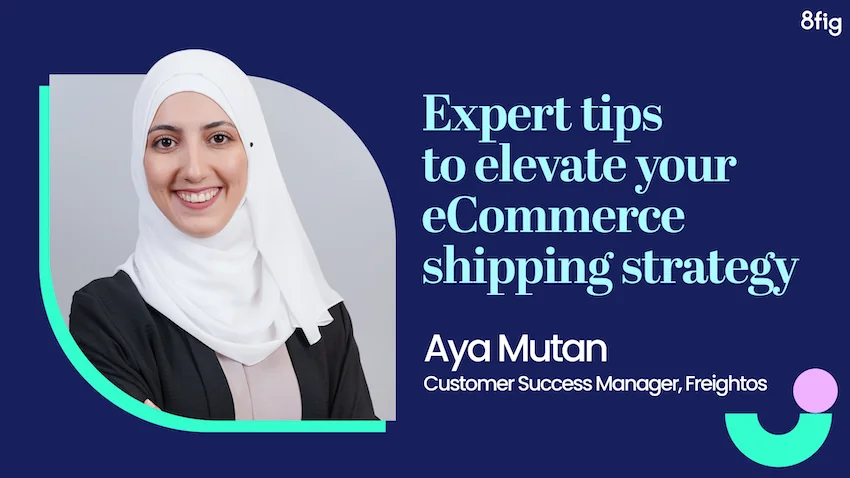An interview with Aya Mutan, Customer Success Manager at Freightos.
Freight and shipping strategy are so important for eCommerce because shipping affects eCommerce in every way. So, any eCommerce business, any business in general, they need products and products need to come from somewhere. So shipping is, if it’s not part of getting the raw material, it might be part of getting the end product or passing the end product to your buyers.
So it’s very important for you to have a very solid eCommerce strategy for your business. We’ve seen, and this is a very good example, because we’ve seen in the past few years that eCommerce has been very affected with all of the shipping chaos that the world went through. As an example, shipping from China to the U.S. west coast was facing crazy price changes.
We’ve seen containers go from $1,800 to $22K, which is crazy for a small business, for example. So someone needed to pay that bill, right? So small businesses and eCommerce businesses needed to deal with all of this, and they were not prepared. So you need to have a strategy that is prepared to deal with all of this chaos.
And even without chaos, it affects your business financially because any price changes when it comes to shipping and freight will affect the cost of your product. You can’t absorb all of that as an eCommerce business, and it might affect the prices and it might affect your demand eventually. So that’s what makes shipping strategy very important for eCommerce.
Another thing is transit times for shipping, because they also affect your stock as an eCommerce seller. They affect the availability of your goods, which also affects your reliability in front of your customers, and it affects your relationships with your buyers, and especially if you have competitors in the market, then sometimes you might not be able to bring buyers back if transit times are affected too much or if prices are affected too much. So you need to be very prepared for anything related to shipping when it comes to eCommerce.
They don’t plan it. They don’t understand how it works. They don’t do their research. It’s very important that you do all of the research even before you start your eCommerce business, because sometimes it doesn’t make financial sense for you to start in eCommerce if it would be too expensive for you to ship, for example. You might need to think of other options, you might need to think of other countries. So it’s very important for you to have a plan ahead of time and a strategy.
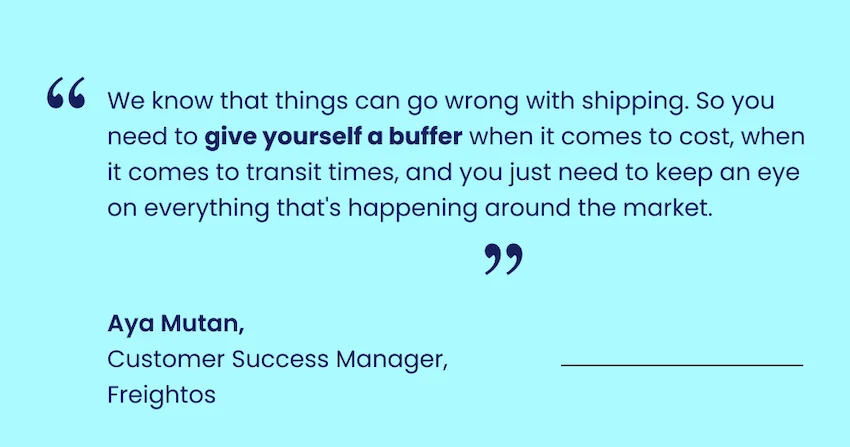
So this is one of the most common mistakes that people make. They don’t plan that ahead. Also, something that people do is that they are not up to date with what’s happening in the shipping market, which is very important. You need to track that. You need to estimate what’s going to happen within a few months. You need to be up to date so that you change what you’re doing accordingly.
Subscribe to the eCommerce newsletter for
top industry insights
So again, I’ll go back to the pandemic. People were hit so hard and they had no idea that this was going to happen. But now that we know that some things can affect shipping this much, we need to plan ahead and we need to always have plan B and plan C and maybe more than that.
Another thing is, even if there is nothing like going wrong around the world when it comes to shipping, you need to always give yourself a buffer. Some people don’t give themselves a buffer. They have the estimated transit time, for example, they take that for granted, and they plan everything according to an estimated transit time.
But we know that things can go wrong with shipping. Things can get delayed, which in some cases cannot be avoided. So you need to give yourself a buffer when it comes to cost, when it comes to transit times. And you just need to keep an eye on everything that’s happening around the market.
You need to be very flexible to deal with the supply chain chaos. You need to understand that anything can go wrong and you need to be prepared for that. So different buyers went with different options, different ways to deal with the chaos. But a few of the things that our buyers mentioned are going with different logistics providers for different shipments instead of using one freight forwarder. So they try to go with different freight forwarders, because for each shipment they choose the best for them.
A freight forwarder is a company that handles everything related to shipping when it comes to operations. So usually the freight forwarder is not the carrier. There are two different parties. The carrier is the one that actually owns the ships and airplanes. The freight forwarder is the one that arranges bookings with the carriers and with the different agents that handle the shipment along the way.
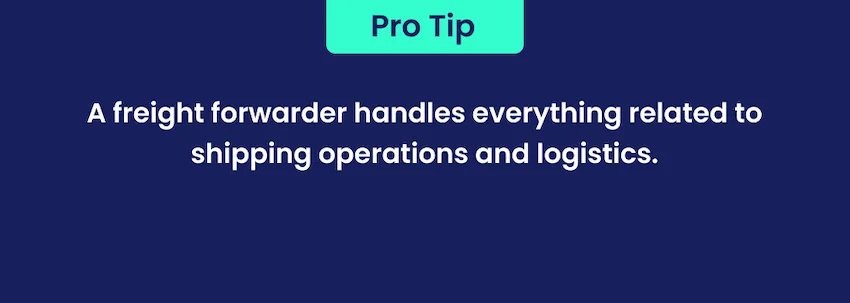
So a freight forwarder, you can book your shipment with them. They can handle everything related to shipping for you when it comes to operations, which means that they arrange between the different parties, the different agents from pick-up to the carrier portion to delivery to the final destination. They can also arrange with other parties that offer other services like customs clearance and insurance, for example.
So usually there are different parts to each shipment. It’s not only about transportation, so the freight forwarder is the one to arrange all of the communications and all of the operations for you.
Are they reliable? Are they experienced? Should I actually trust them with my shipping? Again, we go back to the fact that shipping affects your eCommerce business a lot, so you need to make sure that you go with someone that is trustworthy, someone that is licensed to do freight forwarding.
So you don’t want to get into legal issues. You want to make sure that it’s someone that’s doing everything in following the legal processes in any country that you’re shipping to or from. And you need to make sure that they have experience with the specific requirements of your product because different products need different things. They are sensitive. You need to make sure that they are aware of the requirements for sensitive cargo, as an example.
And another thing is that you need to see the different options. So you need to compare between the different shipping companies. You need to see if each shipping company is actually including all of the services that you’re asking for. Because sometimes, you see that a shipping company offers you a price, and you see that it’s cheaper than any price that you’ve seen anywhere. But when it comes to handling the shipment, you see extra charges coming in every few days. And this is a huge issue when it comes to your shipping cost estimations.
And this is where Freightos comes to help you with all of the comparisons. So it’s very helpful for you to work with a platform or a third party that has different options from different shipping companies, because instead of you going to each shipping company to get a price, you can find everything in one place.
For example, the Freightos platform where we have all of the prices from different freight forwarders in one place for you to compare. They have a very clear breakdown of each quote. They also have transit times. And one important point that I forgot to mention when choosing a freight forwarder is whether they handle the mode that actually makes sense for your cargo.
Because for some shipments, or for shipping, you might need air shipping, you might need ocean shipping, you might need express shipping. It depends on the load, it depends on the routing of your cargo.
We need to be very honest when it comes to avoiding shipping delays because sometimes they are not avoidable. Sometimes you just need to understand that you can’t avoid them.
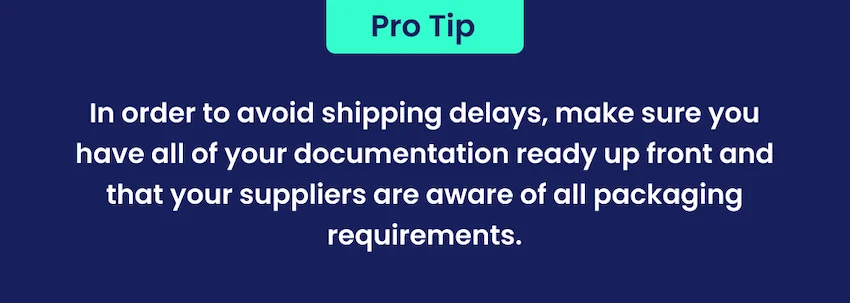
But a few things that you can do to avoid what can be avoidable, is to make sure that you have all of the documentation ready up front. So you need to make sure that the supplier that you’re dealing with for your eCommerce business has experience dealing with the commodity that they are selling you. Because if they have experience, they know all of the documentation needed for your commodity, for customs clearance and shipping, and they’ll provide that up front rather than the forwarder coming at a later stage asking them for documentation that they cannot provide, and that can cause issues with customs and handling.
You need to make sure that your suppliers also are aware of all of the packaging requests and requirements because that might affect your cargo during shipping and might cause delays and might cause loss or damage if it’s not packaged properly. It goes back to the freight forwarder, because if the freight forwarder is trustworthy, you will know that they’ll do everything and they’ll go above and beyond for your shipment to be delivered without delays.
And if you choose a trustworthy freight forwarder, you need to actually trust them. Because at some point the freight forwarder cannot avoid delays, especially if it’s related to, for example, congestion at destination ports or origin ports, when it comes to lockdowns, when it comes to anything that’s out of their control. And another example is customs delays or customs examination, which is random and can affect any shipment no matter what you do.
So it’s very important to be educated. You need to understand that these things can happen and you need to prepare yourself for the worst so that you know and you are patient when it actually comes.
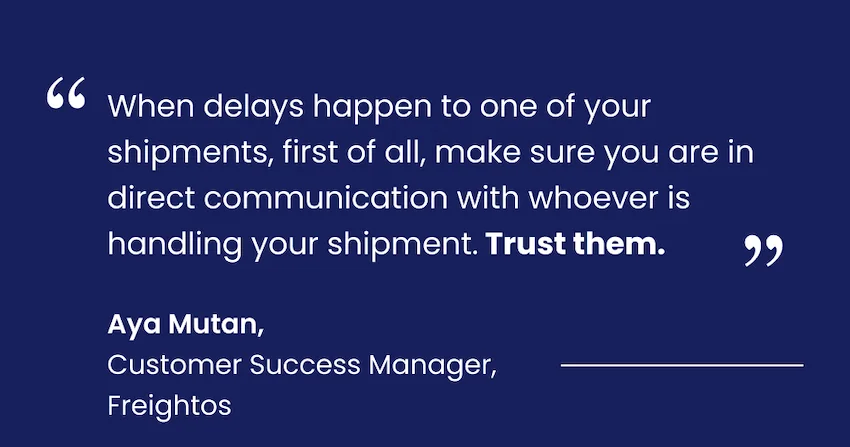
When delays happen to one of your shipments, first of all, make sure you are in direct communication with whoever is handling your shipment. Trust them. Be very patient because as I mentioned before, sometimes it’s not avoidable. Sometimes they can’t do anything about it.
As long as the freight forwarder or the shipping company that you’re dealing with is good and in communication, then just wait for updates, be patient with that, and try to understand how that is affecting your business and go to your plan B and C that we mentioned before.
So for example, some buyers, when they are shipping ocean, and a shipment is expected to be delayed by one month, they go with a very small air shipment so that they have stock until the ocean shipment arrives. So, be flexible with dealing with the situation, trust the shipping company that you’re dealing with.
When it comes to ordering cargo, again, there’s no black and white. There is no right answer. It depends on the specific commodity that you’re shipping and it depends on the type of that commodity, because if it has a specific season and you want all of your stock to be ready at the specific time, you might want to go with bulk shipping. But if you don’t know or you’re not sure about your demand, you can go with whenever someone orders, I can ship more products.
So it depends on your specific shipment and your specific commodity. And also, some commodities expire within a specific time. So you need to plan your demand, to estimate your demand, and then to ship accordingly. There’s no right answer. It depends, actually. And another thing to take into consideration, if it doesn’t matter for you, if it doesn’t affect your commodity in any way, is prices.
So if shipping by ocean makes more sense financially, then go with that and ship full containers. If air makes more sense for your specific commodity, like for smaller shipments air makes more sense financially, you’ll go with that.
Changing modes in general is related to flexibility because again, depends on what’s happening in the market at the moment. It depends on your demand at the moment. So if you see that you have higher demand at this point, you should be flexible with your shipping modes and you should go, for example, with faster shipping modes like air and express so that you deal with your increasing demand.
But you should also, if that continues, be planning to be more flexible with ocean shipping, of course. Because if you’re shipping LCL at this point, less than full containers, you might need to change to full containers instead.
There is no black and white when it comes to getting the best shipping prices. But you need to do your research and you need to check on all of your options. So as I mentioned, sometimes it goes to the load. So if you can ship smaller shipments every once in a while, that might be the best for you.
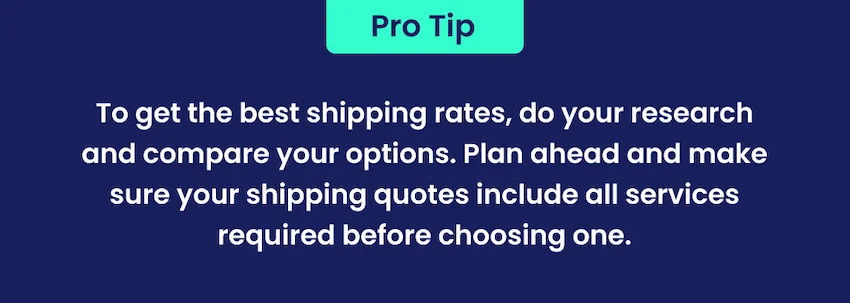
And it depends on your load because sometimes, it depends on the weight of the cargo. Sometimes it depends on the volume of the cargo. These are all factors that affect the shipments. So depending on the actual product that you’re shipping, it can differ from one buyer to the other how to choose the best pricing.
But the main thing to do is to compare, ask the supplier to provide the freight quote. Go to freight forwarders and go to platforms that provide freight forwarder offerings, and compare between them. And again, you need to make sure that they include all of the services because some prices seem like they are great when you begin shipping, but then they become more expensive than the rates that you did not choose.
So you need to make sure that you include everything up front. You need to take into consideration the load that you’re shipping, if it works best with air, ocean. It also depends on the seasonality of the cargo. So this is something also to take into consideration.
And start planning before the time comes. Start planning very early, so that you check all of your options and see the best for you. Another thing that you can do when it comes to negotiation is, if you get a price from your supplier, for example, and a price from a different freight forwarder, you might go back to your supplier and negotiate with them to match the different prices. Some freight forwarders do that when they want to keep a buyer, especially if they’re booking with them regularly.
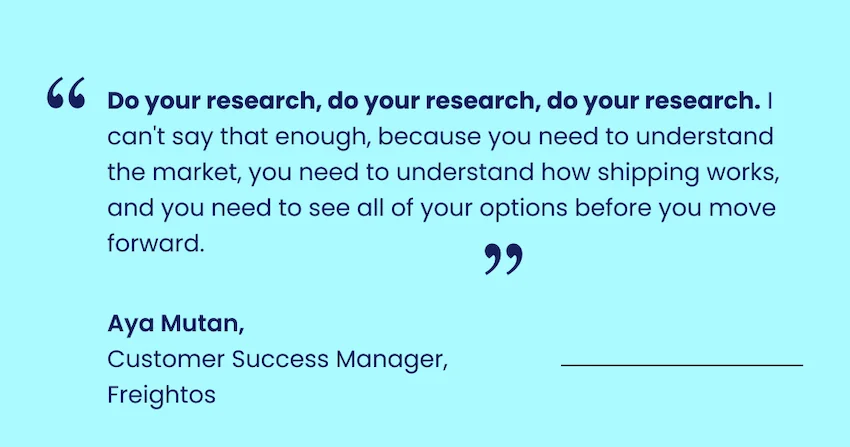
Do your research, do your research, do your research. I can’t say that enough, because you need to understand the market, you need to understand how shipping works and you need to see all of your options before you move forward. And the other thing is, expect the worst. Always expect the worst because it can go smoothly, but it can go wrong and that can happen to any shipment around the world.
Subscribe to the eCommerce newsletter for
top industry insights

Crack the code to funding your eCommerce business with this step-by-step guide, and learn how to secure the capital you need to grow while staying on top of your strategy.

Stuck with extra inventory after Amazon’s Spring Sale? Learn five smart strategies to clear unsold stock, boost cash flow, and avoid future overstocks with smarter inventory planning.
![BFCM: The ultimate guide to eCommerce sales [2025]](https://www.8fig.co/wp-content/uploads/2023/09/cover-2-768x432.jpg.webp)
Get ready for Black Friday and Cyber Monday with our guide on maximizing sales through smart inventory management, effective marketing strategies, and leveraging eCommerce financing.
